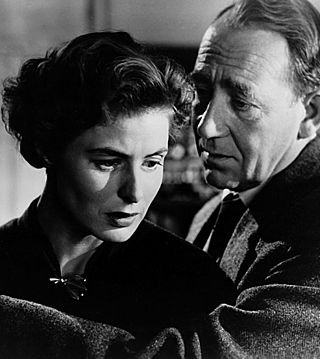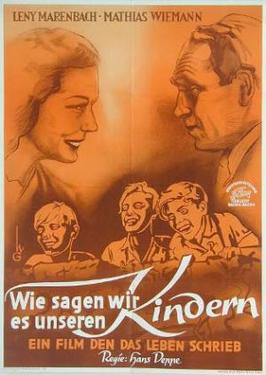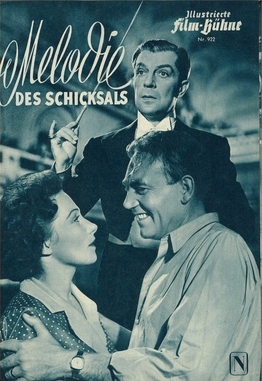The 9th National Board of Review Awards for American cinema were announced on 30 December 1937.

Mathias Wieman was a German stage-performer, silent-and-sound motion picture actor.
Franz Schafheitlin was a German film actor. He appeared in more than 160 films between 1927 and 1974. He was born in Charlottenburg, Berlin, Germany and died in Pullach, Germany.
Paracelsus is a 1943 German drama film directed by G. W. Pabst, based on the life of Paracelsus.
I Accuse is a 1941 Nazi German pro-euthanasia propaganda film directed by Wolfgang Liebeneiner and produced by Heinrich Jonen and Ewald von Demandowsky. It was developed to promote the involuntary euthanasia of disabled people conducted through the Aktion T4 mass murder program and to garner public support for the Nazi concept of life unworthy of life.

Anna Favetti is a 1938 German romantic drama film directed by Erich Waschneck and starring Brigitte Horney, Mathias Wieman and Gina Falckenberg. The screenplay was written by Walter von Hollander, adapted from his own novel Licht im dunklen Haus. The film was made at the Babelsberg Studios in Potsdam. Location filming took place in Italy and Switzerland. Its sets were designed by the art director Gustav A. Knauer.

Under the Lantern is a 1928 German silent film directed by Gerhard Lamprecht and starring Lissy Arna, Gerhard Dammann and Mathias Wieman. The film's art direction was by Otto Moldenhauer.

Suburban Cabaret is a 1935 Austrian musical drama film directed by Werner Hochbaum and starring Mathias Wieman, Luise Ullrich and Oskar Sima. It was shot at the Sievering Studios in Vienna. The film's sets were designed by the art director Alfred Kunz. It is based on the play Der Gemeine by Felix Salten.

The Love Hotel is a 1933 German comedy film directed by Carl Lamac and starring Anny Ondra, Mathias Wieman and Peter Voß. It was shot at the Bavaria Studios in Munich. The film's sets were designed by the art directors Wilhelm Depenau and Erich Zander. A separate French-language version was also made.

The Merry Farmer is a 1927 German silent film directed by Franz Seitz and starring Carmen Boni, Werner Krauss and S.Z. Sakall. It is based on the 1907 operetta of the same title. A 1951 film adaptation was also made.

Dangerous Guests is a 1949 West German comedy film directed by Géza von Cziffra and starring Wolf Albach-Retty, Vera Molnar and Paul Kemp. It was made at the Wandsbek Studios of the Hamburg-based Real Film. The film's sets were designed by the art director Mathias Matthies. It was remade by von Cziffra in 1960 as the Austrian film Crime Tango.

My Brother Joshua is a 1956 West German drama film directed by Hans Deppe and starring Willy A. Kleinau, Ingrid Andree and Kenneth Spencer. It is a heimatfilm.

How Do We Tell Our Children? is a 1944 German comedy film directed by Hans Deppe and starring Leny Marenbach, Mathias Wieman and Hilde Körber. Made by the major German studio UFA, the film was not released until 21 December 1949 in Berlin and 13 March 1951 in Austria.

Melody of Fate is a 1950 West German drama film directed by Hans Schweikart and starring Brigitte Horney, Viktor de Kowa and Mathias Wieman. It was shot at the Tempelhof Studios in Berlin. The film's sets were designed by the art director Franz Schroedter.

Another World is a 1937 French-German drama film directed by Marc Allégret and Alfred Stöger and starring Käthe Gold, Karl Ludwig Diehl and Franz Schafheitlin. Shot at the Epinay Studios of Tobis Film in Paris, the film is the German-language version of Woman of Malacca. The film's sets were designed by the art directors Jacques Krauss and Alexandre Trauner.

Dreaming is a 1944 German historical musical drama film directed by Harald Braun and starring Hilde Krahl, Mathias Wieman and Friedrich Kayssler. It portrays the lives of the pianist Clara Schumann and her composer husband Robert Schumann.

Her Other Self is a 1941 German drama film directed by Wolfgang Liebeneiner and starring Hilde Krahl, Mathias Wieman, and Erich Ponto.

Love's Carnival is a 1930 German drama film directed by Hans Steinhoff and starring Lien Deyers, Mathias Wieman, and Eduard von Winterstein. The film is base upon the play by Otto Erich Hartleben. It was shot at the Babelsberg Studios in Berlin. The film's sets were designed by the art director Robert Herlth.

The Heart Must Be Silent is a 1944 German drama film directed by Gustav Ucicky and starring Paula Wessely, Mathias Wieman and Werner Hinz. It was produced by Wien Film in the Austrian capital of Vienna, which had been part of Greater Germany since the Anschluss of 1938. It was given further release by West German distributor Deutsche London Film in 1950.

When a Woman Loves is a 1950 West German comedy film directed by Wolfgang Liebeneiner and starring Hilde Krahl, Johannes Heesters and Mathias Wieman. It is based on the play Don't Promise Me Anything by Charlotte Rissmann, which Liebeneiner had previously made into a 1937 film of the same title.
This page is based on this
Wikipedia article Text is available under the
CC BY-SA 4.0 license; additional terms may apply.
Images, videos and audio are available under their respective licenses.
















